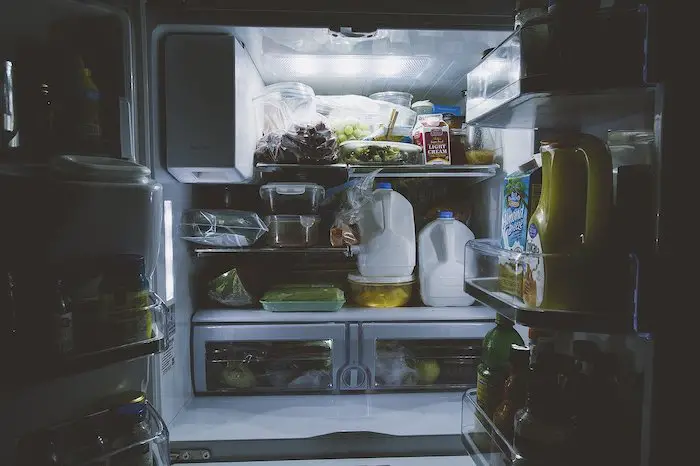A kitchenaid refrigerator is one of those household appliances that are always running nonstop. I mean, you are always storing perishable foods, and as long as you are living and eating, you will need your food preserved, thus, your fridge will always be in use. However, remember that no appliance will last forever, and your fridge is no exception. Thus, it is a good idea to know its lifespan so that you can take better care of it, and know when to stop using money on repairs and acquire a new one.
So, what is the average lifespan of a kitchenaid refrigerator? Depending on the size and model, a well maintained fridge is bound to last for 14 to 17 years on average. A compact one can go for 14 years and 17 years for a standard one. Again, depending on the model and maintenance, you will find some fridges lasting for as low as 10 years while others will last for up to 19 years.
In this article, we will look at how to maintain your fridge to last longer, signs that you may need a new refrigerator, lifespan of other household appliances, and other related questions. Keep reading.
Kitchenaid Refrigerator Maintenance
Having given the average lifespan of a refrigerator, it is important to note that this life expectancy can be reduced by half if you do not practice proper maintenance. This applies to all other appliances in general. To prolong a lifespan, you must take good care of the product in question.
Below are some good maintenance practices for a kitchenaid refrigerator.
- At least every month, ensure you clean the interior of your refrigerator as well as the door gaskets. This way, the fridge and freezer will not have traces of expired or spoilt food and odors. As for the door gaskets, which trap the cold air inside, if you leave messes of food spills, the cold air will start escaping, and the condenser will strain working harder than it should.
You can clean the gaskets with a damp cloth or sponge. For the general interior, use a mild detergent. You will have gotten rid of any odors in the fridge.
- Ensure to change/replace the water filter if present, at least after every six months to reduce water contaminants and aid in water flow to the ice maker and dispenser without clogging up. However, if you are sure that your water supply is safe, you can go without filters altogether.
- After every six months, ensure to replace the air filter in your KitchenAid refrigerator to eliminate food odors and neutralize any existing odor, as air will be flowing freely.
- You will also need to clean the condenser coils through vacuuming. This should be done at least twice a year in a span of six months. The aim is to remove accumulated dirt, grease, dust, grime, hair, and debris, all of which hinder the coils’ ability to dispel heat; limiting their efficiency, and possibly causing a breakdown.
When vacuuming, use the soft brush attachment; however, refer to the manual, as not all models need their coils cleaned. In whatever case, the coils should be some inches from the wall. This means your fridge should not stand so close to the wall.
- Avoid placing items on the top of your fridge as this could interfere with heat dissipation. If your fridge is kept under a kitchen cabinet, ensure there is some space, at least an inch.
- To aid proper door functioning, ensure that the fridge is placed on level grounds. This also goes a long way in helping with icemaker operations.
- If there is a drip pan, ensure you empty it and have it cleaned at least 3 times a year.
- Also, regularly check the internal temperature, which should be 37 to 40 degrees Fahrenheit.
The above-mentioned tips will help in proper maintenance as well as extension of lifespan of your KitchenAid refrigerator. A fridge is an expensive investment, and you will need to take care of it as needed.
How Do You Know When to Buy a New Fridge and Throw Away the Old One?
As already seen, a fridge can last for many years. However, it does not last forever. Even with proper maintenance, there comes a time when the lifespan is overstretched, and you realize that a new one could be better than the costly repairs you keep incurring.
Below are some of the signs.
- If you start noticing excessive condensation inside the fridge, it means the temperature is unstable and this may make the food go bad. Depending on the duration you have had the fridge, you can either call in repair services, or get rid of it if it has reached its lifespan.
- The motor can be a little warm; however, if it gets excessively hot, and given that you have had the fridge long enough, you can just put it aside and get a new one. The latter could be behaving abnormally having reached its expected life expectancy.
- If you notice that your food is becoming stale quickly and that drinks take a long time to cool, you could be wasting a lot of energy and throwing away so much food because of your faltering fridge. If the fridge is new, you can consider repair; otherwise, get a new one and save a lot of energy consumption.
- If the fridge is more than 10 years old, and you are dealing with constant repairs, you can save yourself the menace by buying a new fridge.
- If the fridge produces so much noise, you can call in a technician. However, if the problem persists, do not insist on keeping that fridge, especially if it is old.
If you are experiencing any of the above problems, and you are unable to decide whether to make a purchase or persist with the repairs, you can call in a technician so that you can make an informed decision.
Sometimes you can rush into buying a new fridge only to find out later that the problem could have been fixed. On the other hand, you may keep doing one repair after another, only to find yourself wasting so much money when you could have had a permanent solution of buying a new fridge.
General Lifespan of Other Household Appliances
Below are some common household appliances, their lifespan and secret for extending their life expectancy.
Oven and stoves – they can last for 13 to 15 years. Clean them regularly but avoid using the self-cleaning feature for the oven. Most ovens will not withstand the heat produced.
Dishwasher – has an average lifespan of 9 years. Use it at least once every day because lack of use can cause component failure. Ensure to clean the interior and remove food buildup at the bottom and in the filter.
Microwave – it lasts 9 to 10 years. Just clean it up and handle the door gently. Avoid using it to cook; it is best used for 3 minute warming of food.
Washers and dryers – these ones will last for 10 to 14 years depending on usage.
Related Questions
When is the right time to buy a new fridge?
If your current fridge is old, and it keeps breaking down from time to time, it is the right time to call it a wrap and save yourself of the constant repair expenses by buying a new one.
How do you wash a KitchenAid refrigerator?
When it is time to clean your fridge, first remove all food, then disconnect it from the power source. Remove all the removable parts and hand wash them using mild detergent and warm water. Wipe the interior parts and dry thoroughly using a dry towel. Return the removable parts in their places and then reconnect your fridge.
See Also:
KitchenAid Pasta Press Vs KitchenAid Roller
5 Top Kitchenaid Pasta Attachments
KitchenAid Professional 5 Plus Vs KitchenAid Artisan


